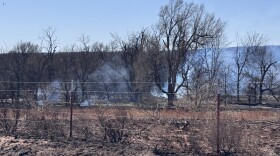Half of Kansans are either very or moderately concerned that Kansas may be running out of water, according to a new statewide survey by the Docking Institute of Public Affairs at Fort Hays State University.
“I can remember, 20 years ago, nobody wanted to talk about the depletion of the Ogallala (Aquifer),” said state senator Carolyn McGinn, who also serves as a member of the Kansas Water Authority. “And now, I mean, farmers are talking about it.”
Parts of western and central Kansas have battled severe drought the last several years. Wichita is currently enforcing outdoor watering restrictions as a result.
In response, the Docking Institute decided to include questions about water conservation for the first time in its annual survey.
“As we are seeing drier conditions in general, we thought it was important to know what Kansans are thinking about these water conservation efforts that are being put in place by local governments,” said Alexandra Middlewood, a political science professor at Wichita State University who worked on the survey.
One in three Kansans think state and local governments are not doing enough to conserve water. Between 33% and 40% think state and local governments, respectively, are doing the right amount.
A tiny minority – less than 4% – of Kansans think the state and local governments are doing too much when it comes to water conservation.
Middlewood said the survey results seem to indicate resistance to water restrictions like the city of Wichita’s is less than may be expected.
"If you read the comments on news articles, there are a lot of people who are upset about those restrictions,” Middlewood said. “But what it looks like statewide is that that's actually not a larger trend – that that is a small minority."
Gary Janzen is Wichita’s public works and utilities director, as well as a member of the Kansas Water Authority. He said getting “buy-in from the community” on water conservation is vital.
“The more people understand where we're going with this, what our challenges are, what our long-term goals are, I think we're going to be at a better place,” Janzen said.
At the state level, Kansas officials are currently engaged in conversations about how it will implement the Kansas Water Plan, which focuses in part on conserving and protecting water in aquifers and reservoirs. The Kansas Water Office held 14 meetings across the state this summer and fall to get feedback on a potential plan to invest $140 million a year to carry out the water plan.
Currently, Kansas puts about $60 million a year toward the water plan.
“I think because we've gone out and talked to different regions, that people are starting to think about their water supply,” McGinn said.
McGinn did say that the Kansas Legislature is skeptical about the proposal to more than double the water plan’s budget. The water plan budget already increased significantly in 2023, and she said she wants to see results from those programs before adding more money.
The survey asked whether Kansans prefer voluntary action or new laws limiting water consumption to conserve water. At both the state and local level, about one in three respondents believed new laws were the way to go, while another third wanted voluntary action. The last third didn’t know.
McGinn said she doesn’t see mandatory water restrictions coming from the state level in the near future. The money allocated to the state water plan goes to programs like buying water rights, monitoring wells, dredging reservoirs and improving dam safety.
Copyright 2024 KMUW | NPR for Wichita







